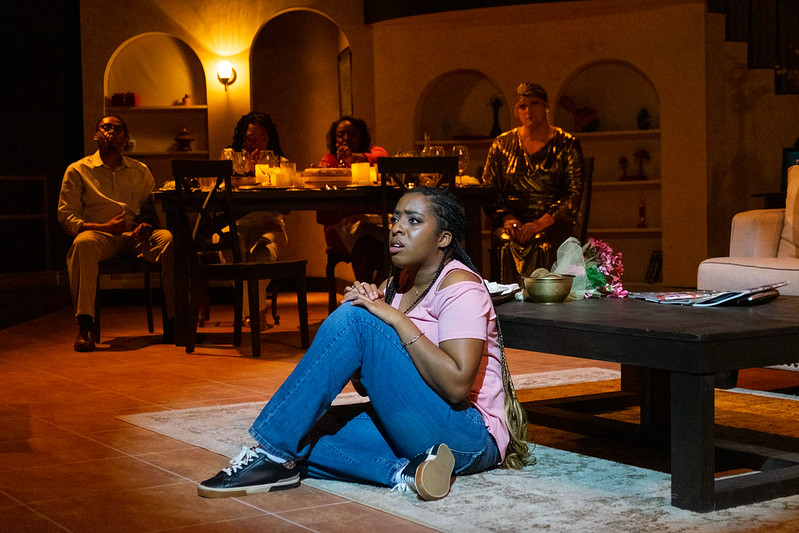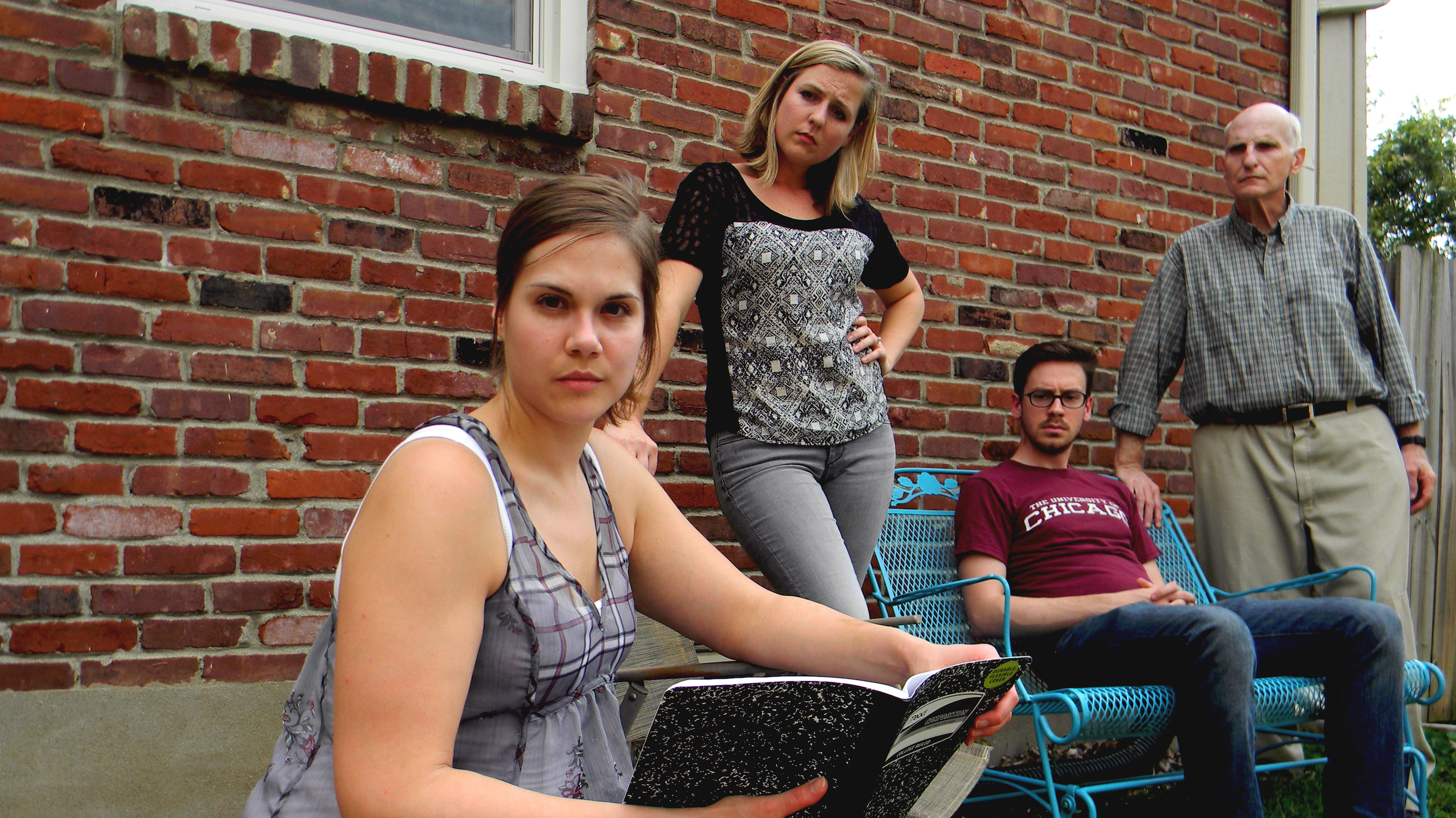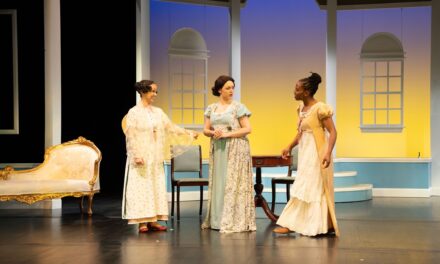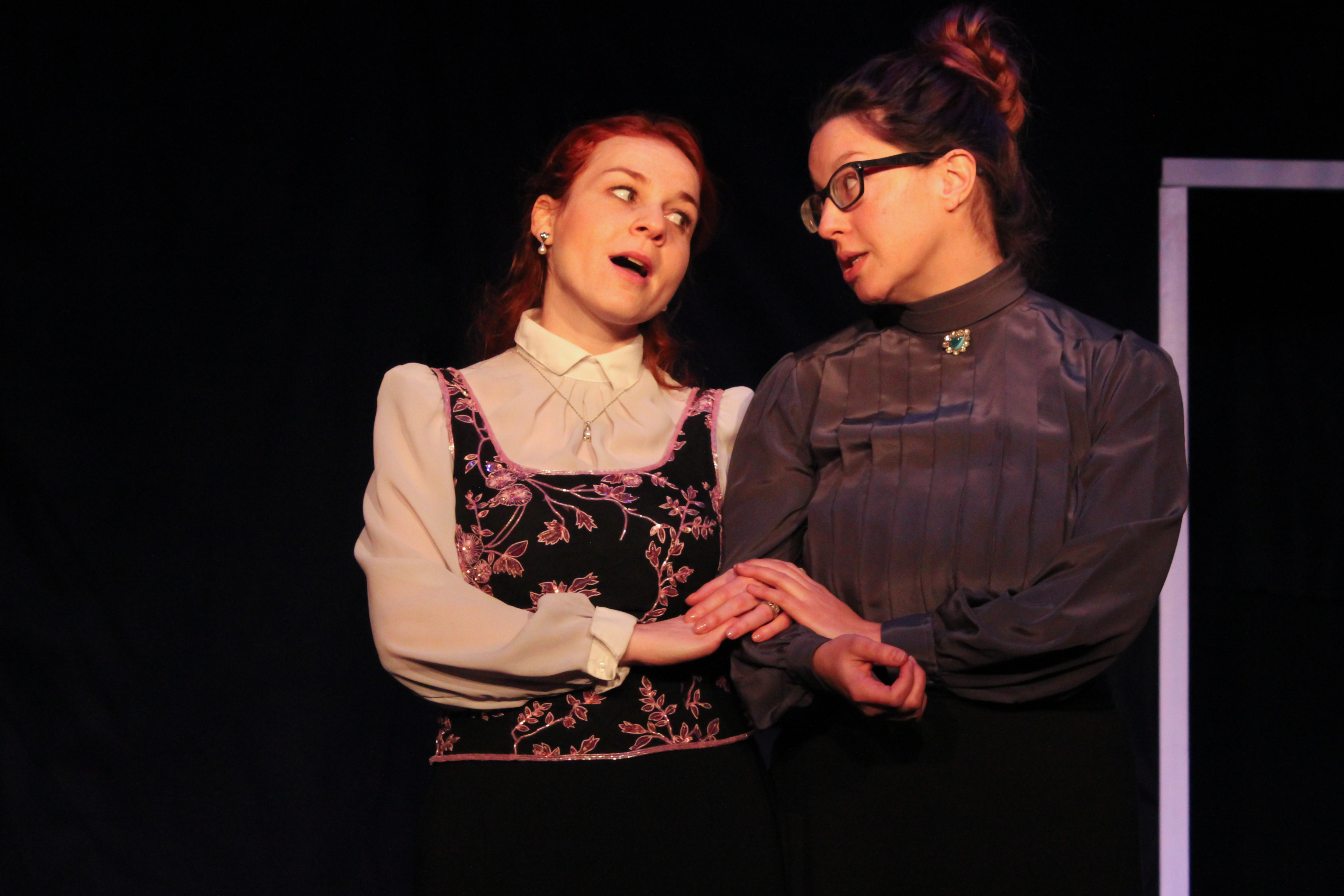Faith Artis in Fairview. Photo: Tom Fougerousse for the University of Louisville
Fairview
By Jackie Sibblies Drury
Directed by Catron Booker
A review by Keith Waits
Entire contents are copyright © 2023 by Keith Waits. All rights reserved.
Winner of the 2019 Pulitzer Prize for Drama, Fairview is provocative in theme, structure, and tone. It’s a journey you will not fully understand until the final moments and even then you are only starting to think about what has happened.
The pre-show music of theme songs from classic Black sitcoms from the 70s and 80s such as Good Times, What’s Happening, and Different Strokes put you in a particular mindset, and the first act plays like a weak tea spoof of those shows, as we meet members of a middle-class Black American family preparing for the grandmother’s birthday dinner. The characters flirt with the kind of out-sized, slapstick comedy featured in those shows, a type of performance that at the time was often criticized as being derived from minstrelsy, a patronizing representation of African American culture. In only a few years, the grounded, three-dimensional depiction of a lower-income Black family in Good Times had transformed into characters bordering on clownish in What’s Happening.
Yet the first act doesn’t have much impact, and in this production from the University of Louisville’s African American Theatre Program, the awkwardness felt like a mix of the writer’s intention and the performances being just shy of ready for opening night. What is going on and what is Jackie Sibblies Drury up to here?
In act two (there are no intermissions but the demarcation points are very clear) the previous action is played out again but instead of the character’s fairly mundane dialouge we listen to the commentary of four White people (seen only in silhouette) who are observing the action but quickly indulge in snarky, pseudo-intellectual opinions about race and identity. The device alerts us to the conceptual nature of the play and puts the audience in the position of the patronizing White viewers of those early Black sitcoms.
Finally, things get more surreal as these perspectives merge and the fourth wall is broken in a profound and intentionally confusing ending. No spoilers, but the layering of concept, context, and the breaking of form is dazzling and meaningful. The phrase “provocative theatre” is often bandied about and used injudiciously, but the risks this playwright takes are considerable yet pay off beautifully.
And, not for nothing, but at a time in Kentucky when laws are being pushed to criminalize drag performance, this script includes one drag performance in the script and director Catron Booker cast for a second drag performance both of which would be in violation of such a law, so thar this production pushes the degree of provocation and timeliness even further.
All of which makes the shaky performance all the more disappointing. The stage was filled with skill and talent but the production felt as if it needed a few more days in rehearsal to realize its potential. I kept wanting the cast to pick up those cues a little faster and relax into those character interactions a little more, but the self-conscious tension of their work was still present. Terrific design went a long way – Kevin Gawley’s set was appropriately 3-camera set-up but a little muted – and costumes – Zhanna Goldentul managed to be right on the money in both the 80s fashion for the Black actors and the bizarre appropriation choices of the White actors – but the lighting changes seemed to lack polish and at times felt like final tech with cues being nailed down during the opening night performance.
In the final moments of Fairview, Drury makes a choice for didacticism which would normally rub me the wrong way. I don’t like being preached at when the story and characters are supposed to get the message across. If a sermon is required perhaps the playwright has failed. But Drury has brought us to that moment with enough care that it makes sense, and the delivery is given by a character whose confusion(a very strong Faith Artis who is not at all shaky) has built slowly onstage, leading to a climax in which everything we assume about the theatre experience is reduced to facile distraction and the audience is repositioned to see things from a different perspective.
Featuring Faith Artis, Allie Fireel, Louise Fritz, Tajleed Harvey, Charlie Lauffer, Nyaia Martin, Sarah Stewart, & Krystal Walker
Fairview
April 6, 7, 8, 13, 14, & 15 @ 7:30 pm
April 16 @ 3:00 pm
University of Louisville Dept of Theater Arts
African American Theatre Program
The Thrust Stage
2314 South Floyd Street
Louisville, KY 40292
louisville.edu/theatrearts
Keith Waits is a native of Louisville who works at Louisville Visual Art during the days, including being the host of LVA’s Artebella On The Radio on WXOX 97.1 FM / ARTxFM.com, but spends most of his evenings indulging his taste for theatre, music and visual arts. His work has appeared in Pure Uncut Candy, TheatreLouisville, and Louisville Mojo. He is now Managing Editor for Arts-Louisville.com.





